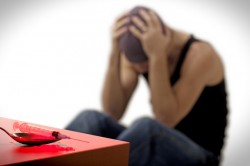Substance Abuse and Mental Illness – Current Statistics
It is a long-observed conclusion that many people with substance abuse problems also have mental health issues. The debate often rests on whether or not one causes the other and if treatment of one can make the other disappear. This can be a heated topic, as some experts insist on treating both as co-occurring disorders, while others may feel that the mental illness symptoms will can go away when the substance abuse is halted. Frankly, there is evidence to support both theories and practices, and to try and stick all people who display such symptoms into one category or another is a wholesale injustice to those needing help. The treatment should be specific to the individual.
According to the most recent National Survey on Drug Use and Health (NSDUH), drug use in the past year was more likely among adults aged 18 or older with past year any form of mental illness than it was among adults who did not have mental illness in the past year, which was about 25 percent and 12 percent, respectively.

Substance abuse treatment needs to be individualized.
This pattern was similar for most specific types of illicit drug use, including the use of marijuana, cocaine, hallucinogens, inhalants, or heroin and the non-medical use of prescription drugs. Only alcohol use had a smaller margin of difference, but the rate was still higher among those diagnosed with any mental illness. This was observed for both binge drinking and heavy alcohol use.
The survey found that the more severe the mental illness diagnosis, the greater the percentage of substance abuse. For example, 31 percent of those with serious mental illness used illicit drugs, followed by 27 percent for moderate and 21 percent with mild diagnoses, compared to 12 percent with no diagnosed mental illness. It is difficult to say, however, whether or not if these same substance abusers would be diagnosed with mental illness if they were not under the influence of the drugs.
Overall, 42 percent of the 19 million adults who had a substance use disorder in the past year also had a co-occurring mental illness, whereas only 18 percent were diagnosed with any form of mental illness who did not have a substance use disorder. Turned round the other way, 17 percent of those diagnosed with a mental disorder also met the criteria for substance abuse dependence or abuse, while only 6 percent did for those with no mental diagnosis.
While these numbers certainly are not conclusive of the theories regarding which comes first or how they should be treated, they do paint a clear picture of the fact that mental illness and substance abuse are common traits among each other. When seeking a rehab center for substance abuse, find out if they also treat co-occurring disorders and if so, what are their treatment methods. Hopefully finding the least invasive therapies will work and the more severe treatments will not be needed.

